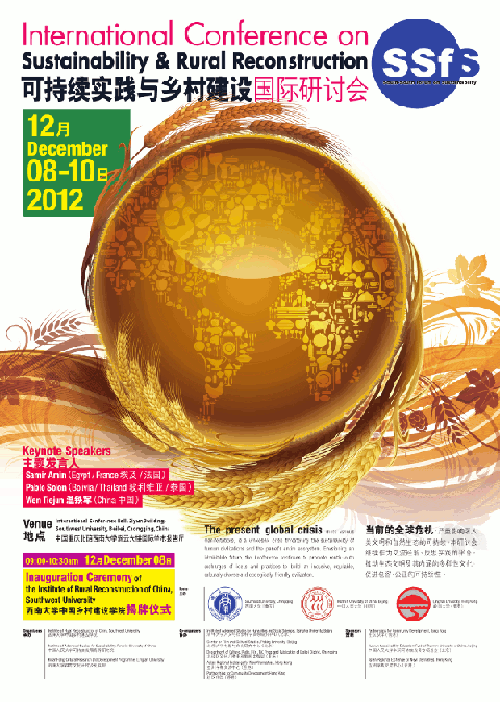Event Title
2012 International Conference on Sustainability & Rural Reconstruction
Start Date
9-12-2012 2:00 PM
End Date
9-12-2012 3:15 PM
Language
English
Description
This paper aims to scrutinize the concept of sustainability in rural development projects by focusing on two recently established “sustainable rural cities” inChiapas,Mexico. First, it will analyze how the International Development Institutions and the Mexican state authorities have employed the concept of rural sustainability. Second, it will lay a historical background to examine why and how these sustainable rural cities have become a policy priority of the Mexican state since 2010. Finally, the paper will present and discuss the findings of the fieldwork carried out in sustainable rural cities of San Juan Grijalva and Santiago el Pinar. The paper will argue that although these sustainable cities were presented as development projects to concentrate dispersed rural communities for better public service delivery, the outcomes of these projects so far include cultural and social disintegration, proletarianization and enhanced political control.
本文旨在通过观察两个新近在墨西哥恰帕斯地区成立的“可持续发展农村城市”来探讨农村发展项目的可持续性。首先本文会分析国际发展组织及墨西哥政府如何理解和运用农村可持续发展这个概念;其次,本文将给出一个历史背景,来解释自2010年以来墨西哥政府为何及如何将构建可持续发展农村城市作为施政重心。最后,本文会介绍并讨论在两个“农村城市”——圣·胡安·格里哈尔瓦及圣地亚哥·艾尔·皮纳尔的考察结果。虽然这些“农村城市”作为发展项目的首要目的是集中分散的农村社区以提供更好的公共设施服务,这些项目同时也导致了文化和乡土社会的分散,社会成员的无产阶级化,及政治控制的加强。
Document Type
Conference
Recommended Citation
Topal, A. (2012, December). Sustainability in rural development projects in Mexico. Paper presented at 2012 International Conference on Sustainability & Rural Reconstruction, Southwest Unversity, Chongqingng, China.
Included in
Demography, Population, and Ecology Commons, Growth and Development Commons, Other International and Area Studies Commons, Place and Environment Commons, Sociology of Culture Commons
Sustainability in rural development projects in Mexico = 墨西哥农村发展项目的可持续性
This paper aims to scrutinize the concept of sustainability in rural development projects by focusing on two recently established “sustainable rural cities” inChiapas,Mexico. First, it will analyze how the International Development Institutions and the Mexican state authorities have employed the concept of rural sustainability. Second, it will lay a historical background to examine why and how these sustainable rural cities have become a policy priority of the Mexican state since 2010. Finally, the paper will present and discuss the findings of the fieldwork carried out in sustainable rural cities of San Juan Grijalva and Santiago el Pinar. The paper will argue that although these sustainable cities were presented as development projects to concentrate dispersed rural communities for better public service delivery, the outcomes of these projects so far include cultural and social disintegration, proletarianization and enhanced political control.
本文旨在通过观察两个新近在墨西哥恰帕斯地区成立的“可持续发展农村城市”来探讨农村发展项目的可持续性。首先本文会分析国际发展组织及墨西哥政府如何理解和运用农村可持续发展这个概念;其次,本文将给出一个历史背景,来解释自2010年以来墨西哥政府为何及如何将构建可持续发展农村城市作为施政重心。最后,本文会介绍并讨论在两个“农村城市”——圣·胡安·格里哈尔瓦及圣地亚哥·艾尔·皮纳尔的考察结果。虽然这些“农村城市”作为发展项目的首要目的是集中分散的农村社区以提供更好的公共设施服务,这些项目同时也导致了文化和乡土社会的分散,社会成员的无产阶级化,及政治控制的加强。
